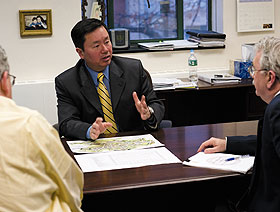  |
| HOME | THIS ISSUE | CALENDAR | GRANTS | BACK ISSUES | < BACK | NEXT > |
Engineering dean seeks to attract top faculty, students to School by Michael Kirk - March 24, 2008 | ||||
| Even as a child, Mun Choi liked tinkering with electronics and mechanical gadgets. That early passion has led to a career as an engineer. “I always enjoyed taking things apart and putting them back together,” says Choi, the new dean of UConn’s School of Engineering. “I really did have a passion for understanding how things work, and that led to my interest in engineering science. For me, it was a natural calling.” Choi, who began as dean in January, is now working to put together a School of Engineering that is one of the most prominent in the nation. He plans to build on its existing strengths and enhance the School’s signature programs. Choi was born in Seoul, South Korea, and moved to the U.S. with his parents and three sisters. His father established a company that manufactured martial arts and industrial uniforms, first in Akron, Ohio, and then in Chicago – a company his father still owns and operates. Choi is a graduate of the University of Illinois at Urbana-Champaign and received his Ph.D. in mechanical and aerospace engineering from Princeton University in 1992. He served as a National Research Council post-doctoral fellow at the National Institute of Standards and Technology, and as a faculty member in mechanical engineering at the University of Illinois at Chicago, before joining Drexel University in 2000. Choi’s primary research interests are in the areas of energy conversion, experimental diagnostics, and pollutant mitigation. His programs have been funded by various federal agencies, including the National Science Foundation, the Department of Defense, Department of Energy, and NASA. But it was his desire to effect change within departments and schools that led him to seek out leadership positions. “I felt I could contribute to the institutional impact by serving as a dean,” he says. “What attracted me to UConn was the clear, strong support for the future of the School from the state and within the institution, as well as from industry. Key components of this are the faculty, who are clearly one of the strongest assets of the School.” UConn Provost Peter J. Nicholls said when Choi was hired, “I believe that in Mun we have found an outstanding leader for the school. His significant interest and experience in increasing opportunities for engineering education and innovative programming for students at all levels will be invaluable to us as we realize the new academic plan.” One of Choi’s most immediate goals as dean is to hire faculty through the $4 million public-private partnership established by the legislature, known as the ‘eminent faculty’ program, which is designed to attract top researchers in sustainable energy to UConn.
“For the eminent faculty program, we’re currently evaluating several candidates, who are among the most renowned researchers in the world,” says Choi, adding that he expects to have the positions filled by the end of the current semester. “This will really enable us to become one of the top sustainable energy research and training programs in the nation,” he says. Choi cites sustainable energy research as being one of the School’s critical areas of focus, along with biomedical engineering, nanotechnology, informatics, environmental engineering, and advanced manufacturing. UConn was also recently selected as the research lead institution for the Department of Homeland Security Center of Excellence on Transportation Security, a consortium of seven institutions from across the United States. This activity, which will involve all the departments in the School, will develop close collaboration with leading industries in surface, air, and water transportation security. “It really is about tackling some of the grand challenges of engineering,” he says. “We are not a large school, so we are strategically developing our focus. These challenges very often straddle disciplines; sustainable energy, for example, involves not only engineering, but also chemistry, physics, agriculture, and economics, to name a few. There is also a need to work with industry in areas such as developing new products through translational research.” Choi says that one of his major missions is to enhance communication and a sense of community throughout the School, a process he has begun by meeting with faculty members, staff, students, and alumni. “I really felt it was important for me to engage all the stakeholders, hear what was on their minds, discuss their aspirations, and create a dialogue,” he says. “There is a great deal of interdisciplinary work, and understanding the research and educational activities of colleagues can be instrumental in integrating mutual interests and benefits.” Choi says his priorities also include promoting undergraduate graduation rates, establishing research opportunities in emerging areas, identifying industry internships, and ensuring that UConn Ph.D.s are placed at prestigious academic institutions and research labs. “My goal,” he says, “is both to use our existing strengths and to build our areas of focus to make the School of Engineering an institution of choice for top faculty and students in the nation.” |
| ADVANCE HOME UCONN HOME |

